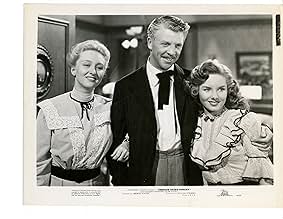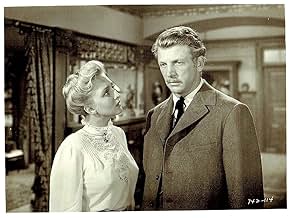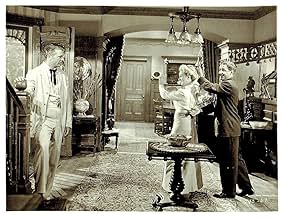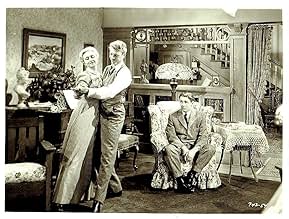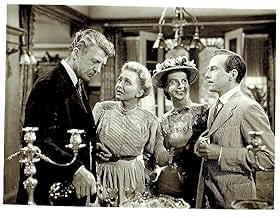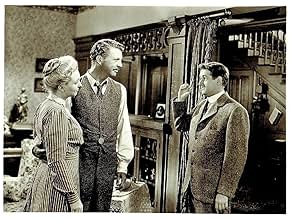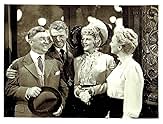A rueful wife (circa 1910) recalls 20 years of her husband's financial fumbles, as she keeps a boarding house to support the family.A rueful wife (circa 1910) recalls 20 years of her husband's financial fumbles, as she keeps a boarding house to support the family.A rueful wife (circa 1910) recalls 20 years of her husband's financial fumbles, as she keeps a boarding house to support the family.
Claude Airhart
- Reverend
- (uncredited)
George Beranger
- Jake Barker
- (uncredited)
Douglas Carter
- Barfly
- (uncredited)
6.4301
1
2
3
4
5
6
7
8
9
10
Featured reviews
Cute, old-fashioned movie
I stumbled across this offering on TCM during a Natalie Wood movie night. I wasn't certain I'd stay with it till the end, but I wound up doing so. It's a great example of the kind of movies "they don't make anymore". Corny & schmaltzy in spots...OK a lot of spots...it nevertheless was amusing, downright comical at times, & the actors made it work. It was great to see Alan Young, as all I recall him from is Mr. Ed. Celeste Holm is a gem, as is Dan Dailey. This could be a very effective stage play. I was a bit disappointed that Natalie Wood had such a small role, but I would recommend this flick for an evening of sheer escapism!
Exasperating corn
Faintly ridiculous piece of nostalgic film-flam concerning newlywed couple in early 1900s Tucson; he's the vice-president of the bank and she's the jovial sort of housewife who prides herself on knowing her husband better than he knows himself. Due to the husband's investments and charity, the twosome are forced to take in boarders immediately following their wedding and, as the years progress, their household turns into the neighborhood room-and-board, complete with children of their own. Nothing more than a contract picture for Fox, cheaply-made and cheaply-felt. Valentine Davies and director George Seaton based their script on both Rosemary Taylor's book and the later play by Julius J. and Philip Epstein, which some critics have since compared to the 1970s television series "The Waltons". But even "The Waltons" had a bit of vinegar underneath its homespun scenario; here, beaming wife Celeste Holm plays mommy to her ne'er-do-well hubby, her children, her boarders...she even plays matchmaker for her high-strung daughter and the bashful kid upstairs who can't dance. Natalie Wood appears briefly as one of the tykes, and William Frawley adds some zip as a potential investor in a copper mine, but otherwise this rosy-hued hokum fails to stay the course. *1/2 from ****
10B24
Classic American cinema, circa mid-20th century
From the novel by Rosemary Drachman Taylor -- who wrote some sequels as well -- this film more or less accurately portrays the life of a pioneer Tucson family at the turn of the last century. As such, it cannot survive much fictional tampering or other kinds of cinematic tricks. It has to be taken strictly as a straightforward tale of ordinary people engaged in ordinary life struggles.
What sets it apart from other stories of its kind is the unique character of the entrepreneurial father, as played moderately well by the late Dan Dailey. An engaging man who was known as well as an accomplished dancer, he played the role of the author's father always looking for but never quite arriving on "Easy Street." Celeste Holm, who has come to be almost a legend in her own time, is the long-suffering but constant and practical mother.
Certain license is involved with some outdoor takes, but on the whole I recommend the film highly as an amusing and true story. Don't be put off by the absence of any clever or unusual plot twists or weird characters. This is the very definition of "G" rated.
I grew up a few houses down from the actual Drachman house. It was only one story, but capacious.
What sets it apart from other stories of its kind is the unique character of the entrepreneurial father, as played moderately well by the late Dan Dailey. An engaging man who was known as well as an accomplished dancer, he played the role of the author's father always looking for but never quite arriving on "Easy Street." Celeste Holm, who has come to be almost a legend in her own time, is the long-suffering but constant and practical mother.
Certain license is involved with some outdoor takes, but on the whole I recommend the film highly as an amusing and true story. Don't be put off by the absence of any clever or unusual plot twists or weird characters. This is the very definition of "G" rated.
I grew up a few houses down from the actual Drachman house. It was only one story, but capacious.
A Delicious Slice of Americana
Based on Rosemary Taylor's memoir of life in turn-of-the-century (i.e., circa 1900) Tucson, the book's subtitle tells much of the story -- "My Life with Mama's Boarders." Rosemary's mother was a practical businesswoman who wasn't above renting out every available square foot of her home to make ends meet. This movie, though, like the book, is a delightful look backward at life in a frontier city in the century's first two decades, featuring Celeste Holm as her mother and Dan Dailey as her more fly-by-night father, who always has a get-rich-quick scheme that, somehow, doesn't pan out. In addition to Dailey (who had several short-lived TV series in the 1970s), later generations will enjoy spotting cast members like Alan Young (quite the rising star in 1948, but remembered now mostly as Wilbur Post from "Mr. Ed" and as the voice of Uncle Scrooge in Disney's "Ducktales"), William Frawley (remembered, of course, from "I Love Lucy" and "My Three Sons"), and ubiquitous character actor Whit Bissell, who appeared in everything from "Star Trek" to "I was a Teenage Werewolf."
This movie is another small gem from director George Seaton and his writing partner, Valentine Davies, who also gave the world the original "Miracle on 34th Street," "The Country Girl," and "The Song of Bernadette." Seaton isn't that well-known today, unfortunately, even though almost everyone has seen at least "Miracle on 34th Street," but like Frank Capra, his movies have a quiet humanity that, even when he used a lighter touch (as here), show Seaton's faith in human resilience. When people say that "they don't make them like they used to," they're talking about movies like this.
This movie is another small gem from director George Seaton and his writing partner, Valentine Davies, who also gave the world the original "Miracle on 34th Street," "The Country Girl," and "The Song of Bernadette." Seaton isn't that well-known today, unfortunately, even though almost everyone has seen at least "Miracle on 34th Street," but like Frank Capra, his movies have a quiet humanity that, even when he used a lighter touch (as here), show Seaton's faith in human resilience. When people say that "they don't make them like they used to," they're talking about movies like this.
Room And Board
Chicken Every Sunday plays like a combination of It's A Wonderful Life and Papa's Delicate Condition. Based on the memoirs of Rosemary Taylor growing up in Tucson, Arizona at the turn of the last century, it tells the story of her parents played by Dan Dailey and Celeste Holm and how this loving family nearly came apart.
The narrative is in flashback as Celeste Holm is relating to an attorney why she wants after so many years of marriage to Dan Dailey with three children to show for it, a divorce. Celeste has put up with quite a lot and in fact is the one who is really keeping the family together.
Dailey is a product of his time, a firm believer in the idea with the right scheme promoting the right product, he can get himself a permanent address on easy street. He resents the fact that Celeste Holm has decided to go into a little business of her own, a boardinghouse. But that boardinghouse and the income from it has kept the family from being on the street.
It looked to me like Chicken Every Sunday might have been thought of as a musical when first on the drawing boards at 20th Century Fox. It certainly was a waste not have musical performers like Dailey and Holm do at least one number together for posterity. Watching the film you can practically drop in the where the numbers should be.
20th Century Fox gave Holm and Dailey a good supporting cast with such pleasure to watch professionals like William Frawley, Alan Young, Porter Hall, Katherine Emery and Whit Bissell as some of the various people in their lives. The best two without a doubt are Veda Ann Borg who is Frawley's estranged wife and Connie Gilchrist as her mother. Gilchrist's drunk act is the hit of the film.
Chicken Every Sunday is a pleasant piece of diversion from some musical performers in non-musical roles.
The narrative is in flashback as Celeste Holm is relating to an attorney why she wants after so many years of marriage to Dan Dailey with three children to show for it, a divorce. Celeste has put up with quite a lot and in fact is the one who is really keeping the family together.
Dailey is a product of his time, a firm believer in the idea with the right scheme promoting the right product, he can get himself a permanent address on easy street. He resents the fact that Celeste Holm has decided to go into a little business of her own, a boardinghouse. But that boardinghouse and the income from it has kept the family from being on the street.
It looked to me like Chicken Every Sunday might have been thought of as a musical when first on the drawing boards at 20th Century Fox. It certainly was a waste not have musical performers like Dailey and Holm do at least one number together for posterity. Watching the film you can practically drop in the where the numbers should be.
20th Century Fox gave Holm and Dailey a good supporting cast with such pleasure to watch professionals like William Frawley, Alan Young, Porter Hall, Katherine Emery and Whit Bissell as some of the various people in their lives. The best two without a doubt are Veda Ann Borg who is Frawley's estranged wife and Connie Gilchrist as her mother. Gilchrist's drunk act is the hit of the film.
Chicken Every Sunday is a pleasant piece of diversion from some musical performers in non-musical roles.
Did you know
- TriviaWarner Bros. first bought the rights to the novel in 1944 and Mervyn LeRoy was hired as the director. But Warners subsequently sold the property to Fox.
- Quotes
Emily Hefferan: There are other homes in town that take in guests.
Rita Kirby: Yeah, I tried 'em all. Those dumps are full too. I mean... nice place you got here.
- ConnectionsFollowed by The 20th Century-Fox Hour: The Hefferan Family (1956)
- SoundtracksWhen You Wore a Tulip and I Wore a Big Red Rose
(uncredited)
Music by Percy Wenrich
Lyrics by Jack Mahoney
Performed by a chorus during the opening credits
Also played at the dance hall
Details
- Release date
- Country of origin
- Official site
- Language
- Also known as
- Roligt nästan jämt
- Filming locations
- Production company
- See more company credits at IMDbPro
- Runtime
- 1h 34m(94 min)
- Color
- Aspect ratio
- 1.37 : 1
Contribute to this page
Suggest an edit or add missing content

